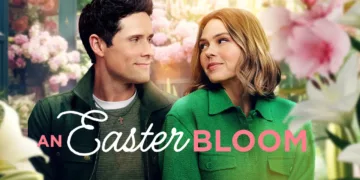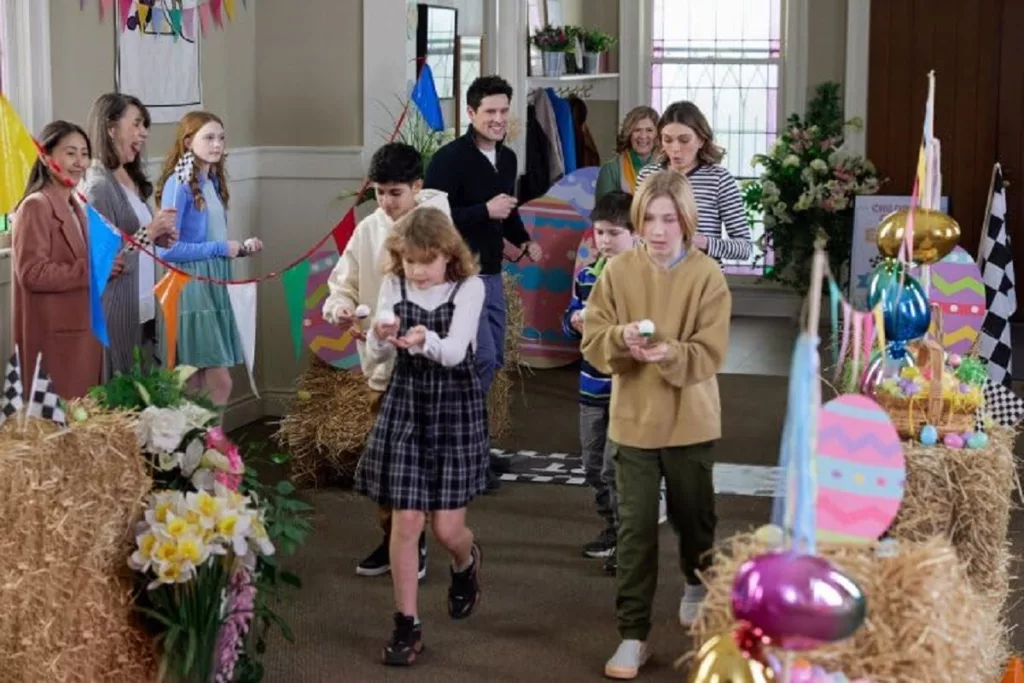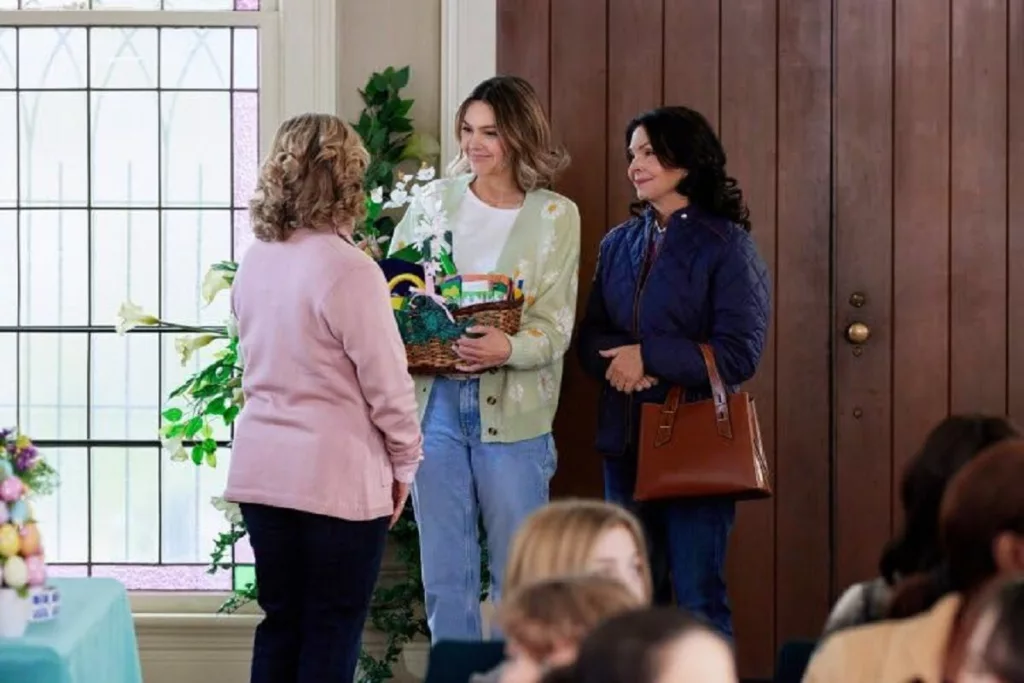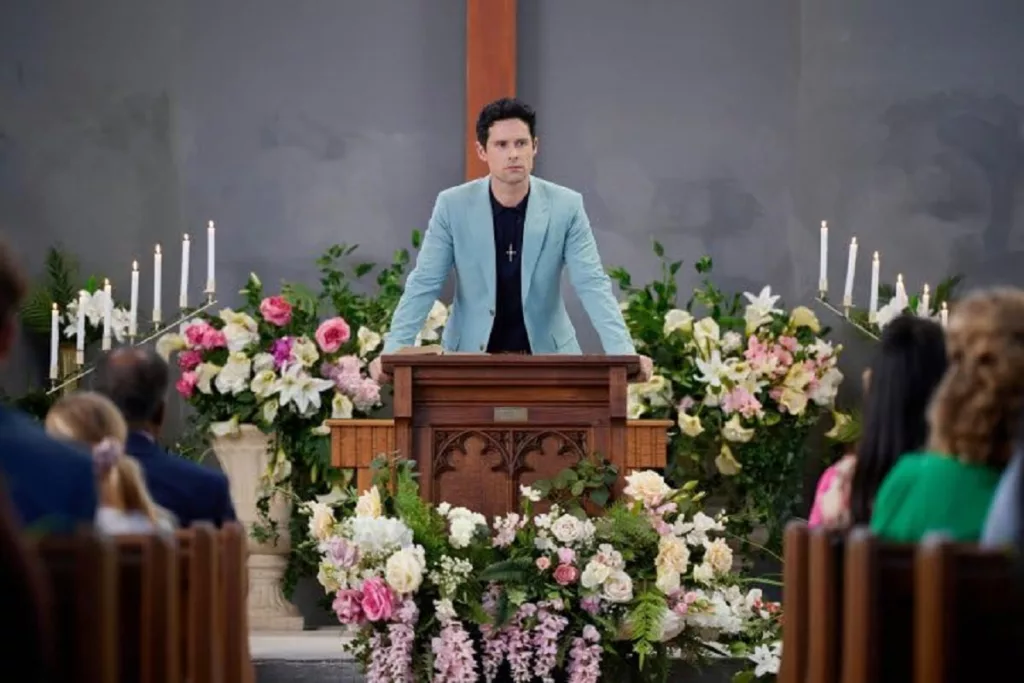The Hallmark Channel’s latest offering, “An Easter Bloom,” blossoms as a heartwarming tale of spiritual renewal amidst life’s harshest seasons. At its core, the film trails Amanda, a devoted daughter grappling with the imminent loss of her family’s floral farm following her father’s passing. Her path to preserving this cherished legacy unexpectedly intertwines with the arrival of a new pastor and his nurturing mother, a seasoned florist carrying her own baggage of broken dreams.
As Amanda pursues an unlikely flower arranging competition, complete with a life-altering cash prize, her journey transcends mere financial gain. It becomes a poignant exploration of reclaiming one’s faith in the divine, embracing forgiveness, and experiencing the revitalizing power of second chances – much like the vivid blooms that emerge after winter’s chill.
In a daring departure from its usual romantic confections, Hallmark boldly ventures into overtly Christian territory with this pastoral drama. Yet, the network wisely eschews heavy-handed sermonizing, instead weaving an organic, uplifting narrative that seamlessly integrates matters of faith with universal themes of hope, redemption, and inner rebirth. For the converted and unconverted alike, “An Easter Bloom” blossoms with an inspirational fragrance.
A Blossoming Narrative
At the heart of “An Easter Bloom” is Amanda, a devoted daughter clinging to her family’s floral farm in the wake of her father’s passing. A cruel frost has withered away not just the vibrant blooms that are their livelihood, but Amanda’s own sense of purpose. Teetering on the edge of bankruptcy, a chance encounter with Lori, a retired florist, sows the seeds of an unconventional plan – to enter the high-stakes state flower arranging competition and its lucrative prize.
Though an amateur in this delicate art, Amanda finds an unlikely mentor in Lori, who guides her through the nuanced principles of harmony, contrast and balance that transform mere blossoms into breathtaking arrangements. However, Lori’s own emotional thorns surface through her strained relationship with Constance, her erstwhile best friend and Amanda’s fiercest competition rival.
Providing spiritual buoyancy is Derrick, the new pastor at Amanda’s childhood church. Though a deeply faithful man, Derrick conceals his own checkered past as an extreme sports enthusiast, fearful that his congregation may judge his reckless pursuits. An accident that once imperiled a friend only compounds Derrick’s guilt-ridden struggles.
As Amanda is molded into a fledgling florist by Lori’s tender tutelage, an organic bond also blossoms between her and Derrick, each recognizing in the other a kindred soul searching for redemption. Their intertwined journeys breathe life into the farm’s barren landscapes through bountiful narrative blooms of hope, forgiveness, and resurrected passions.
Fertile Spiritual Soil
While “An Easter Bloom” sprouted from the fertile creative grounds of the Hallmark Channel, known for its sugary romantic confections, this pastoral tale opted to till deeper into the spiritual soil. At its very roots, it is an exploration of humanity’s innate yearning for faith, purpose, and the divine grace that breathes new life into withered souls.
For Amanda, her crossroads arrives in the form of a harsh frost that obliterates not just her family’s floral livelihood, but her own sense of meaning. The loss of her father’s steadying devotion exacerbates this crisis of faith, leaving her adrift and questioning the grand design. Yet through an unlikely intersection with the worlds of flower arranging and pastoral guidance, Amanda undertakes a transformation akin to the glorious blooms she has struggled to nurture.
Her journey is complemented by Derrick, the new pastor whose deep convictions are belied by his concealment of a daredevil past. An extreme climbing accident shadowing his spiritual awakening has left him burdened by misplaced guilt and trepidation about congregants judging his former reckless persona. Derrick’s internal arc poignantly mirrors the themes of forgiveness – for others, but crucially for oneself.
At the crux of these interwoven narratives is the powerful idea that even tenaciously wounded relationships can be revived through acceptance and empathy. This is best embodied by the rift between Lori and her former friend Constance, whose long-festering grudges echoed the barren landscapes of Amanda’s farm before blooming anew upon shared understandings.
While unabashedly grounded in overt Christian values and allegories, “An Easter Bloom” avoids turgid preachiness. Instead, it presents an authentic, relatable exploration of the universal triumphs and struggles that shape one’s spiritual journey – speaking to the inherent human desire for second chances at renewal, no matter one’s faith or creed.
“Unravel a cozy mystery in our One Bad Apple: A Hannah Swensen Mystery review. Join Hannah as she solves a murder in her small town, combining culinary charm with a dash of suspense.”
Blossoming Artistry
While “An Easter Bloom” undoubtedly flourishes in its spiritual messaging, the production itself showcases an array of artistic qualities that elevate it beyond mere pious platitudes. At the forefront is a talented ensemble realizing the layered emotional arcs with authenticity and understated grace.
Aimee Teegarden imbues Amanda with a relatable vulnerability, her expressive eyes mirroring the heroine’s internal journey from despair to rekindled faith. As her mentor Lori, Frances Flanagan exudes a natural warmth and wisdom that anchors the narrative, while Benjamin Hollingsworth brings requisite charisma and depth to the secretive pastor Derrick.
Under the assured direction of Terry Ingram, the pacing adroitly balances moments of spiritual reflection with an engaging central mystery – Amanda’s quest for the elusive flower arranging prize. Ingram’s restraint is admirable, allowing powerful sequences like Derrick’s stirring Easter sermon to resonate without overwrought embellishments.
Certainly, there are instances where the script veers into slightly heavy-handed metaphors or contrived subplots. However, such minor tonal missteps are overshadowed by the evident care infused into rendering this distinctive Hallmark realm with authenticity.
Visually, “An Easter Bloom” cultivates an inviting palette that immerses the viewer in the lush, colorful worlds of both small-town Americana and florid competition arenas. The cinematography by Michael Witt beautifully captures the celestial magic of dappled sunshine filtering through canopies of new blooms, while production designer Christina Helen Burton imbues every quaint interior with a lived-in hospitable aura.
Fragrant Bouquet, A Few Wilted Petals
Like any finely curated floral arrangement, “An Easter Bloom” exhibits an exquisite interplay of harmonious elements and a few dissonant notes. Among its most vibrant strengths is the deft handling of the spiritual narrative core – Amanda’s journey from spiritual aridity to nourishing revival unfolds with organic authenticity. The film resists simplistic proselytizing, instead allowing its messages about faith, forgiveness and second chances to organically blossom.
Stellar performances, particularly from the trio of Teegarden, Flanagan and Hollingsworth, imbue every petal of the story with conviction. The visual realms crafted, from rustic farms to vivid competition stages, are rendered with a lush, transportive allure.
However, some creative aspects lack the polish and refinement of the central spiritual thrust. Certain supporting subplots, such as Derrick’s crisis over his thrill-seeking past, feel slightly contrived and underdeveloped. There are also fleeting moments where the symbolism borders on heavy-handedness, diminishing the subtlety.
Yet, even with these insignificant blemishes, “An Easter Bloom” represents a superbly cultivated endeavor within the realm of Hallmark’s faith-inspired oeuvre. For the primarily secular audience, it offers an engaging, uplifting immersion into the world of spirituality without erecting barriers. Conversely, for the devoted viewership, it presents a sincere, resonant affirmation of Christian ideals filtered through an accessible lens. A fragrant offering for the secular and devout alike.
Radiant Springtime Bloom
In summation, “An Easter Bloom” represents a radiant springtime emergence for the Hallmark Channel’s spiritual film forays. While certainly catering to its primarily devout viewership with overt Christian allegories and messaging, the production masterfully integrates universal themes of hope, forgiveness and inner rebirth that transcend religious boundaries.
At its fragrant core blooms a sincerely rendered, emotionally resonant drama propelled by an array of strong performances and an assured directorial hand. Even with minor imperfections like faint plot contrivances or fleeting tonal dissonance, the overall experience remains one of uplifting sustenance for the soul.
Amidst a landscape saturated with rote romantic fare, “An Easter Bloom” stands tall as a vibrant, spiritually potent offering. For the faithful audience, it will undoubtedly be embraced as an enriching affirmation of cherished values and ideals.
However, I would ardently implore even the most cynically secular viewer to open their senses to this fragrant narrative. For in its delicately rendered petals lies a universal truth – that times of seeming drought and desolation can indeed give way to the lushest blooms of hope, if only one’s spirit remains fertile with possibility. An inviting experience for all once its beauty is beheld.
The Review
An Easter Bloom
With its deft blend of spiritual affirmation and universal humanity, "An Easter Bloom" represents a welcome maturation of the Hallmark aesthetic. Though not without minor blemishes, the film blossoms as an engaging, poignantly uplifting tale of faith's restorative powers. For the devout, it offers resonant messaging couched in an accessible narrative. For the skeptics, it presents an inviting immersion into the world of spirituality without proselytizing barriers. A fragrant experience for audiences of all creeds and dispositions.
PROS
- Powerful themes of faith, forgiveness, and spiritual renewal
- Authentic, relatable exploration of finding purpose amidst crises
- Strong performances from lead cast, especially Aimee Teegarden
- Visually lush cinematography capturing the beauty of nature
- Deft handling of Christian allegories without being heavy-handed
- Uplifting messages that transcend religious boundaries
CONS
- Some subplot elements feel slightly contrived or underdeveloped
- Minor instances of heavy-handed symbolism or metaphors
- Pacing lags occasionally, especially in the middle portions
- Character arcs for supporting roles could have been fleshed out further
- Tonal balance wavers at times between drama and sugary Hallmark tropes




















































